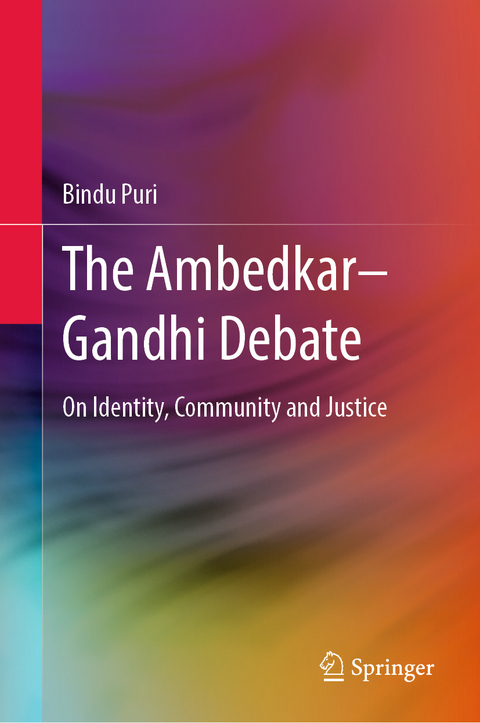
The Ambedkar–Gandhi Debate
Springer Verlag, Singapore
978-981-16-8685-6 (ISBN)
The nature of the self,
The relationship between the individual self and the community,
The appropriate relationship between the constitutive encumbrances of the self and a conception of justice,
The relationship between memory, tradition, and self-identity.
Ambedkar and Gandhi’scontrary conceptions of the self, history,itihaas, community and justice unpack incommensurable world views. These can be properly articulated only as very different answers to questions about the relationship between the present and the past. This book raises these questions and also establishes the link between the Ambedkar--Gandhi debate in the early 20th century and its re-interpretation as it resonates in the imagination and writing of marginalized social groups in the present times.
Bindu Puri is a Professor of contemporary Indian Philosophy at the Centre for Philosophy, School of Social Sciences, Jawaharlal Nehru University. Her main interests in philosophy are in the areas of contemporary Indian philosophy and moral and political philosophy. She has been seriously engaged with the philosophy of M.K Gandhi and her first monograph was on Gandhi and the Moral Life (2004).She has also been keenly interested in the philosophical issues involved in Gandhi’s debates with Savarkar, Ambedkar and Tagore.Her monograph The Tagore-Gandhi Debate: On Matters of Truth and Untruth ( Springer,2015)was published in the series: Sophia Studies in Cross-cultural Philosophy of Traditions and Cultures. She has edited seven volumes and has written over 50 papers in edited anthologies and philosophical and interdisciplinary journals including Sophia, Philosophia and the Journal of the Indian Council of Philosophical Research. She has presented over 160 papers and lectures at nationaland International forums. Professor Puri delivered the prestigious annual ‘M K Gandhi lecture on Peace and the Humanities’ 2017 for the Mahatma Gandhi Peace Council Of Ottawa, Canada and the Johnson and Hastings lectures at the University of Mount Allison Canada for the same year.
1. Chapter 1. Introduction: A Brief History of the Gandhi--Ambedkar Debate.- Chapter 2. Memory, Humiliation, Oppression: Untouchability and Dalit Self-Identity.- Chapter 3. The Individual and the Religious Community: On Religion and Conversion.- Chapter 4. Individual and Collective Identity: Confrontations on Caste and Varna.- Chapter 5. The Politics of an Encumbered Self: Ambedkar and Gandhi on Separate Electorates.- Chapter 6. Debating Guru: Owners and Authors.- Chapter 7. Conclusion: Gandhi and Ambedkar: Philosophical divergences and convergences.
“The book is a must-read for encapsulating the deeper philosophical issues informing the debate between Ambedkar and Gandhi. The author’s long-term familiarity with Gandhi-Ambedkar scholarship … has gained fresh new ground evident in the deep, insightful, and critical reflection on the contradictions involving the two great leaders on the universal ideas of freedom, autonomy and justice. The book will be of value to those who wish to unravel Gandhi-Ambedkar scholarship beyond the conventional polemics and hagiography surrounding the two scholars.” (Sanjeev Kumar and Ratika Gaur, Gandhi Marg Quarterly, Vol. 44 (4), 2023)
| Erscheinungsdatum | 04.03.2022 |
|---|---|
| Zusatzinfo | 2 Illustrations, black and white; XV, 266 p. 2 illus. |
| Verlagsort | Singapore |
| Sprache | englisch |
| Maße | 155 x 235 mm |
| Themenwelt | Geisteswissenschaften ► Geschichte ► Regional- / Ländergeschichte |
| Geisteswissenschaften ► Philosophie ► Allgemeines / Lexika | |
| Geisteswissenschaften ► Philosophie ► Geschichte der Philosophie | |
| Geisteswissenschaften ► Philosophie ► Östliche Philosophie | |
| Geisteswissenschaften ► Philosophie ► Philosophie der Neuzeit | |
| Geisteswissenschaften ► Religion / Theologie | |
| Sozialwissenschaften ► Soziologie | |
| Schlagworte | Confrontations About Caste • Conversion to Buddhism • Crisis of Self-identity • Critique of Social Hierachies • Dalit Imagination • Gandhi's Idea of Ahimsa • Internal Reforms within Hinduism • Memory of Oppression • Movement of the Depressed Classes • Self-purification • Separate Electorates • Separate Entry in Temples • The Buddha and his Dhamma • untouchability |
| ISBN-10 | 981-16-8685-8 / 9811686858 |
| ISBN-13 | 978-981-16-8685-6 / 9789811686856 |
| Zustand | Neuware |
| Informationen gemäß Produktsicherheitsverordnung (GPSR) | |
| Haben Sie eine Frage zum Produkt? |
aus dem Bereich


